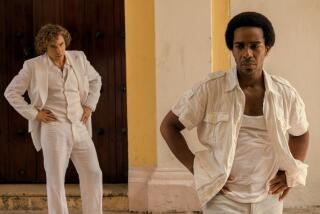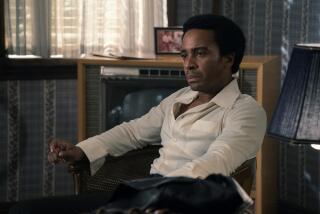Even in Death, Newton Stirs Sparks : Family, Friends Bitter at Those Who Label Him a Criminal
- Share via
OAKLAND — Friends and relatives of slain Black Panther Party co-founder Huey P. Newton recalled the controversial black activist Wednesday as a flawed man whose life should nonetheless inspire people to pursue his fight against “racism, sexism and classism.”
Police, meanwhile, had no new statments to make on their investigation into the pre-dawn shooting of Newton in a violent, drug-soaked neighborhood Tuesday. They declined to comment on news reports that Newton smoked crack and may have been trying to extort money from local drug dealers.
Pat Wright, who lives near where Newton died, told the San Francisco Chronicle that Newton left her house four hours before police found him sprawled on the sidewalk at 5:30 a.m. She denied that he came to the area only to buy cocaine.
“He lived here. He stayed here. This is where he belonged,” she said.
Indeed, there was some bitterness toward authorities who publicly dismissed Newton as a common criminal who died an appropriately violent death.
“There was nothing common about Huey,” said Melvin Newton, the activist’s older brother and teacher at Merritt College in Oakland. “He was not a common gangster or a common anything. He was an uncommon man.”
Stronger words were spoken by the Rev. Cecil Williams, who said that local authorities, particularly the assistant district attorney who unsuccessfully prosecuted Huey Newton in the killing of a prostitute and pistol-whipping of a tailor, were inflaming Oakland’s black community.
“A lot of black people are very angered by the fact that Huey Newton is getting put in the box of being a gangster,” said Williams, pastor of the Glide Memorial United Methodist Church in San Francisco. “That only incites people and could lead to acts of violence.”
Alameda County Chief Assistant Dist. Atty. Tom Orloff told a reporter, “the Huey Newton I dealt with from the mid-1970s on played no positive role in the community in any sense; I saw him as a criminal.”
(Newton’s encounters with the law and courts began in 1964 when he was convicted of felony assault with a knife. Thereafter, his record included a conviction of murdering an Oakland police officer in 1967, but the conviction was eventually overturned. He was accused of the 1974 murder of the prostitute, a case that ended in a hung jury. Another 1974 charge involving the pistol-whipping of a tailor was dropped. In 1982, he was accused of embezzling $600,000 from a Panther-run elementary school; he pleaded guilty earlier this year to stealing $15,000 of state aid to the school and was sentenced to six months in jail. Several weapons charges over the years resulted in three convictions for which he served varying amounts of jail time.)
Former Black Panther David Hilliard said he hopes that statements such as Orloff’s will only further inspire young people to investigate what Newton stood for and take up the cause of social activism, including environmentalism.
“There are still problems with drugs in this country, still problems with economic injustice, still problems with unemployment,” Hilliard said, showing some of the passion of the old Panthers.
“We have an increasing cleavage between the haves and have-nots in this country,” Melvin Newton added. “We need to reach the youth about building a better society rather than just acquiring personal wealth.”
Bobby Seale, who helped Newton found the militant Black Panther Party for Self Defense in 1966, said he was shocked to learn that Newton had died violently, because he had recently embarked on a writing career.
“It’s bad to hear Huey died the way he did,” Seale said in Philadelphia, where he works as a community liaison for Temple University’s African-American Studies Department. “I thought he would live to be the world’s oldest militant senior citizen.”
Newton’s family was less sanguine. Newton’s wife, Fredrika, 37, said she was not surprised to learn that her husband had died violently.
“I’m heartbroken that he did,” she said, sitting in her brother-in-law’s living room in the upscale Oakland hills, “but it was something that I always prepared myself for, the inevitability of it.”
Melvin Newton said that when he considers the higher-than-average rate of crime that African-Americans suffer in the United States, “I’m not surprised when anyone dies of violence.”
Family members declined to discuss Newton’s reported drug abuse, and would not speculate on what he might have been doing alone in an area known for violent drug dealing at such an odd hour.
“I have no idea why he was there,” Melvin Newton said. “He was a man and he had his weaknesses. If America will forgive Huey for his weaknesses, we’ll ask him to forgive America for its genocide of the red man, enslavement of the black man and incarceration of the yellow man.”
Fredrika Newton said her husband was in good spirits lately, although he was concerned about money and was trying to write a book and produce educational films to generate some income.
Hilliard, a longtime friend, said he believes that Newton both missed the tumultuous 1960s and labored under the burden of having to live up to the reputation he earned at that time.
“He was certainly a lonely man, in that there were no more struggles to fight,” Hilliard said. “He missed the struggles of the ‘60s.”
More to Read
Sign up for Essential California
The most important California stories and recommendations in your inbox every morning.
You may occasionally receive promotional content from the Los Angeles Times.













